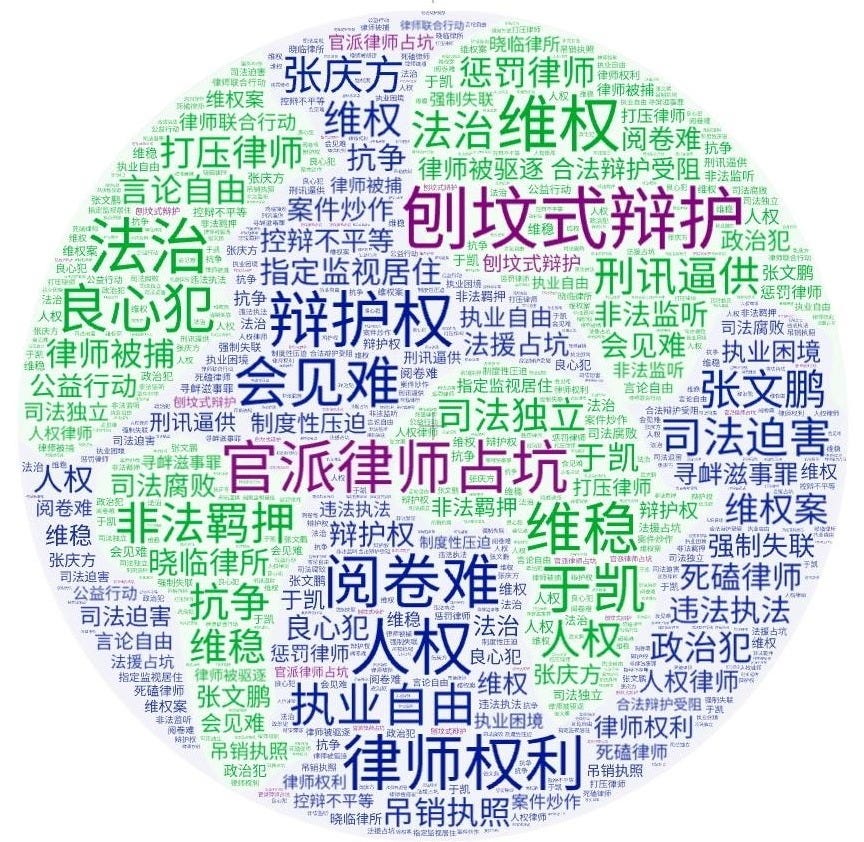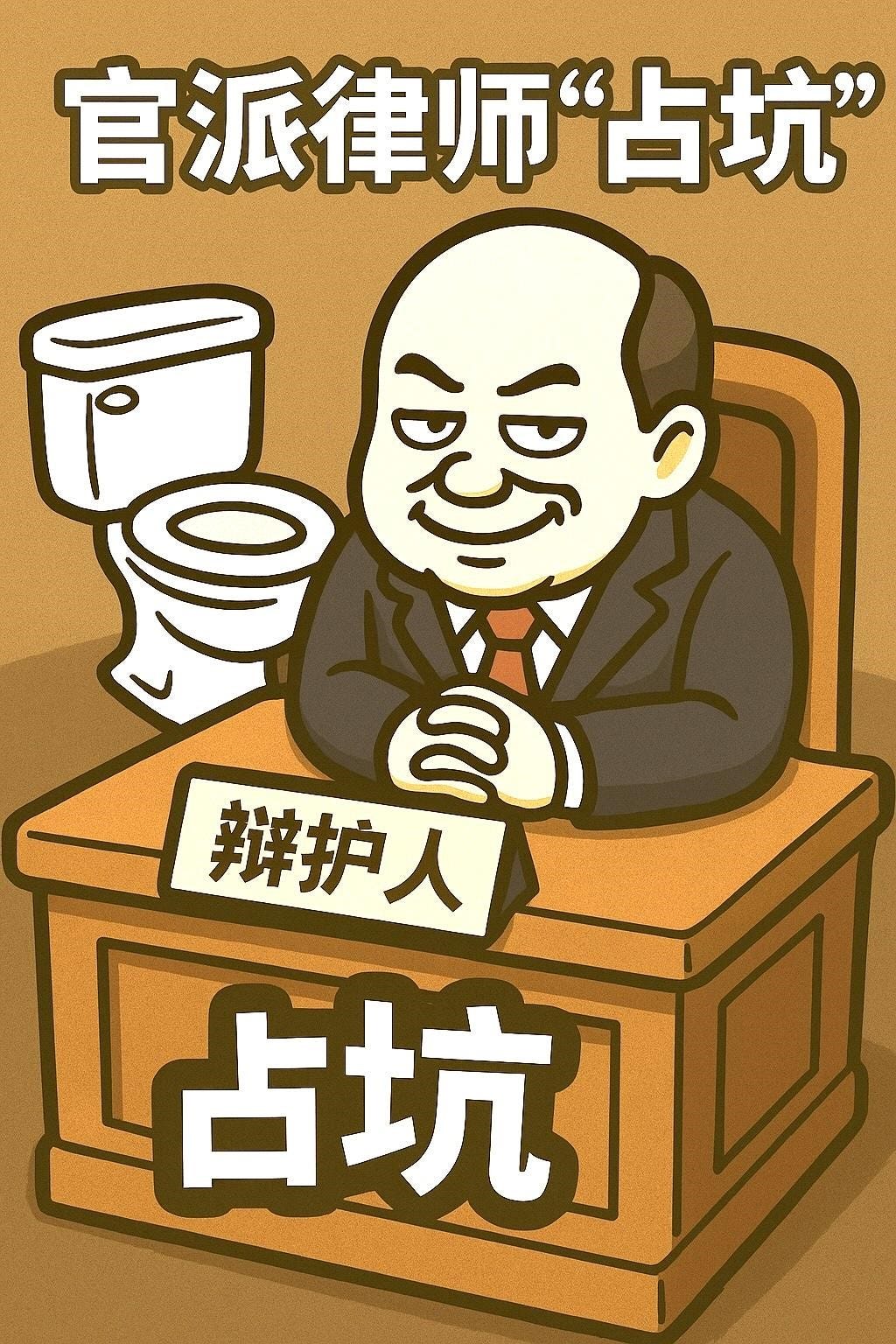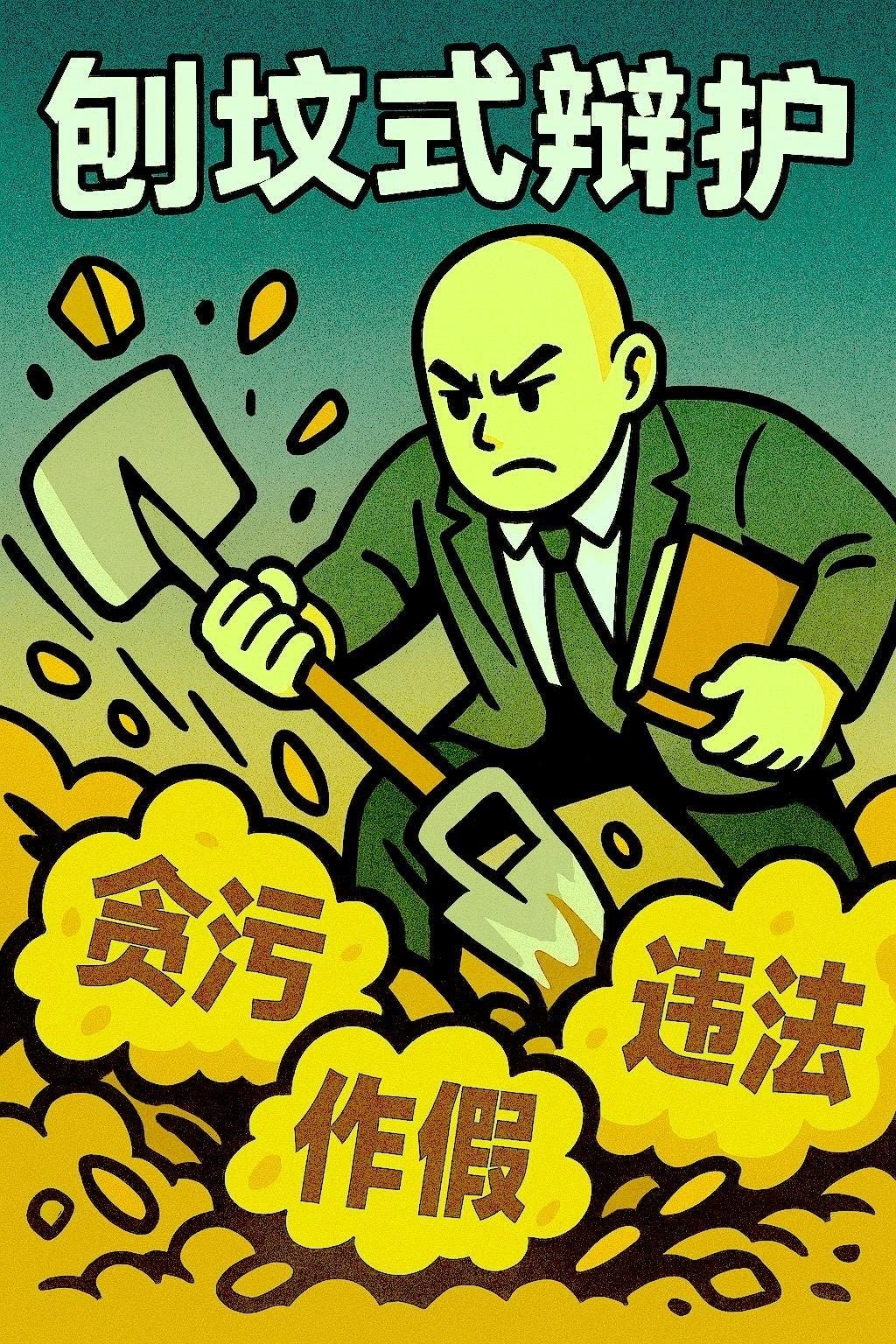2024 Annual Report on Lawyers’ Rights in China Launched By Committee to Support Chinese Lawyers
State-Appointed Lawyers Used to Block Defense Rights; “Grave-Digging Defense” Shocks the Legal World with Its Audacity
后附中文版
On April 28, 2025, the New York-based public interest organization Committee to Support Chinese Lawyers (CSCL) released the 2024 Annual Report on Lawyers’ Rights in China.
The report offers a comprehensive review of the most common rights violations faced by lawyers in civil, administrative, and criminal cases throughout 2024. It documents a range of emblematic cases in which lawyers’ rights were infringed, alongside notable grassroots efforts to defend legal professionals’ freedoms.
Grounded in detailed case studies, the report reveals the structural suppression of the legal profession by state power and puts forward concrete recommendations for systemic reform.
The report was compiled by a team consisting of two rights lawyers still under state pressure in China, three former Chinese lawyers now working with international organizations, and two researchers from public interest law institutions.
According to the report, 2024 marked another year of intensifying repression and shrinking space for lawyers in China. Criminal defense, administrative litigation, and cases involving public interest have become high-risk areas. Lawyers frequently faced harassment, obstruction, disciplinary actions, and in some cases, detention or disbarment for simply carrying out their professional duties. The independence of the legal profession is under severe threat.
The report specifically notes that in 2024, judicial authorities’ practice of appointing “state-assigned” lawyers to preempt independent counsel in criminal cases has become normalized.
Lu Miaoqing, a veteran public interest lawyer with many years of experience practicing in Guangdong, explained:
“The original intent of the legal aid system was to provide basic legal protection for defendants who could not afford to hire their own lawyers. But today, this system is being systematically abused by judicial authorities. It has become a tool to exclude outspoken lawyers, suppress independent defense, and manipulate trial outcomes. Many of the officially appointed lawyers occupy the defense bench but offer no real defense. Instead, they align with the prosecution’s goals—and in some cases, even persuade defendants to forgo contesting the charges. This not only violates legal ethics, but also fundamentally undermines the integrity of justice.”
In response to the growing trend of judicial authorities restricting and undermining independent legal defense, the legal community in China continues to resist with determination. One of the most striking developments in 2024 was the emergence of the bold and unconventional “grave-digging defense” strategy.
According to well known human rights lawyer Li Fangping who used to be based in Beijing, the core tactic of this approach involves publicly exposing the misconduct of judicial officials involved in a specific case—such as corruption, academic fraud, or abuse of power—with the goal of pressuring them to withdraw.
“The rise of the ‘grave-digging defense’ reflects the desperation lawyers face when all conventional avenues of defense are blocked,” Li explained. “While this strategy pushes the boundaries of traditional legal norms and carries a confrontational tone, it has become one of the few ways to expose abuses of public power and tear away the veil that hides judicial misconduct. Its very existence speaks volumes about the deterioration of the rule of law and the shrinking space for lawyers to operate in China.”
Criminal Cases: A Hotbed of Rights Violations; “State-Appointed Lawyers” bacomes a Normalized Obstruction Tactic
The report finds that in 2024, lawyers handling civil and commercial cases primarily faced five categories of risks: attacks from opposing parties, accusations of collusion with individual clients in alleged crimes, accusations of complicity with corporate clients in alleged crimes, wrongful or biased rulings, and conflicts with judges or courts.
It further notes that the risks in administrative cases are similar to those in civil cases, but with even greater difficulty in securing procedural rights. Lawyers often struggle to fully present their arguments. This is largely due to the structural subordination of the judiciary, prosecution, and police to the Political and Legal Affairs Commissions (PLACs) of local Party committees. In cases where government bodies are defendants, courts tend to be institutionally biased in favor of the state.
Most notably, the report identifies criminal cases as the most severe battleground for violations of lawyers’ professional rights in 2024, and outlines several prominent forms of such infringements.
At the forefront is the unprecedented expansion of the abuse of the “state-assigned lawyer” system in 2024. The abuse was once primarily confined to politically sensitive cases and has now spread to a wide range of criminal cases—including gang-related prosecutions and those led by disciplinary and supervisory authorities.
The practice of assigning legal aid lawyers has shifted from being a supplementary safeguard to becoming a substitute mechanism. In effect, “state-assigned” lawyers are used to block independent defense counsel, depriving defendants of their fundamental right to choose their own lawyer.
So-called “slot-occupying defense” refers to the practice in which authorities, through legal aid centers, rapidly assign a lawyer to a defendant—effectively “locking” the procedural window for independent legal representation and securing the defense slot. As a result, lawyers retained by the defendant’s family are unable to intervene.
In many such cases, the defendant neither applied for legal aid nor waived their right to appoint a lawyer. Yet their right to independent defense is silently taken away. Cases such as those of Wu Min and Zhang Zhan are typical examples.
According to the report’s findings,the “slot-occupying” practice has not only become pervasive, but its implementation has grown increasingly calculated and refined, employing ever more varied means to shut out independently appointed defense counsel. Authorities now employ a growing range of tactics to block privately retained lawyers, including administrative harassment, phone and communication disruptions, restricted access to detention facilities, and even launching investigations or disciplinary actions against the lawyers themselves.
Clearly, this is not a matter of isolated misconduct by individual courts or prosecutors—it is a practice that is being systematically institutionalized.
The state-appointed lawyer system was originally intended to serve as a last-resort safeguard—to ensure basic legal representation for those without access to a defense lawyer. However, in practice, it has been increasingly distorted into a mechanism for excluding independent counsel and weakening the power of the defense.
Even more concerning is the fact that some state-appointed legal aid lawyers have gone so far as to openly persuade defendants not to hire their own lawyers, effectively acting as agents of the stability-maintenance apparatus. This phenomenon has turned “defense” into little more than an exercise in facilitating conviction, placing the entire legal aid system in a crisis of credibility and posing a systemic threat to the integrity of criminal defense as a whole.
Beyond the issue of “slot-occupying” by state-appointed lawyers, the report also highlights other forms of infringement on lawyers’ rights within criminal defense. These include: barriers to meeting with clients, restrictions on reviewing case files, high personal risk in conducting investigations, and escalating tensions between defense lawyers and both prosecutors and judges—often leading to retaliation or punishment by judicial authorities simply for carrying out professional duties.
“Grave-Digging Defense”: Defiance Born of Desperation
In 2024, in response to the growing prevalence of “slot-occupying” by state-appointed lawyers, a bold and highly symbolic defense strategy emerged into the spotlight—known as the “grave-digging defense.”
This approach arises when defense lawyers are stripped of their right to participate in a case, and conventional legal avenues prove ineffective against systemic injustice. In such situations, lawyers turn to exposing the misconduct of those abusing their power in a given case—such as revealing personal scandals, academic fraud, or corruption. These non-litigation tactics, akin to “digging up graves,” aim to force a retreat or compel public accountability.
The strategy departs from traditional legal argumentation, instead leveraging public opinion and moral pressure. It represents a fusion of legal resistance and social critique—an act of defiance born not from preference, but from the narrowing space for lawful defense.
Lawyer Zhang Qingfang’s actions in the Wu Min case stand as a landmark example of the “grave-digging defense” strategy. Rather than limiting himself to challenging the legality of the state-assigned lawyer system, he went further—accusing the “slot-occupying” lawyer and the presiding judge of academic fraud and professional misconduct. He mobilized media outlets, social networks, and public letters to bring widespread attention to the issue.
Although his bold actions ultimately led to the revocation of his law license, the public impact of his resistance sent shockwaves through the legal community. In doing so, it significantly disrupted the appearance of legitimacy maintained by the current system.
The emergence of the “grave-digging defense” is a direct response to the systematic blockage of normal defense channels. In an environment where legal avenues are obstructed, courtroom rights are routinely ignored, and administrative interference is pervasive, this tactic—reversing roles and taking the offensive—has become a last resort for some lawyers. It reflects the desperate measures taken when the justice system lacks internal mechanisms for self-correction.
For the lawyers who dare to resist, the personal risks and professional costs are immense. For the broader rule-of-law landscape, it signals a troubling development—yet at the same time, it is also a form of creativity born from desperation.
Recommendations: Systemic Reform to Protect Lawyers’ Rights; Defense Should Embrace Transparency and Collective Action
Building on its account of the violations of lawyers’ rights in 2024 and the various forms of resistance that followed, the report looks ahead to potential changes in the judicial landscape, reflects on the future and challenges of defending prisoners of conscience, and proposes six key recommendations for systemic improvement of lawyers’ rights and effective strategies for legal advocacy.
The report calls on lawmakers to begin the process of reviewing and eliminating vague and overly flexible provisions in the Criminal Law—particularly the offense of “picking quarrels and provoking trouble.” This charge has been widely abused to target rights lawyers, citizen journalists, and dissidents, deviating far from its original legislative intent of punishing serious public disorder. Repealing such charges is a necessary step toward restoring the integrity of the legal system.
The report recommends that judicial authorities ensure three core professional rights for lawyers: the right to meet with clients, the right to access case files, and the right to conduct independent investigations. It calls for the establishment of a unified nationwide appointment system for lawyer-client meetings, standardized time limits for reviewing case files, and a risk exemption framework for defense investigations—to prevent local protectionism and the “stability above all” mentality from overriding defendants’ rights.
The report also advocates for the institutionalization of prosecutorial-defense equality and the abolition of the unspoken rule of “slot-occupying” by state-appointed lawyers. It recommends that the law clearly stipulate: if a defendant or their family has already lawfully appointed a lawyer, no legal aid lawyer should be assigned; legal aid lawyers may not intervene in a case without the defendant’s written consent; and all instances of court-appointed defense must be subject to independent oversight and judicial review.
The report also recommends reforming the current state-controlled, government-led structure of bar associations in China. It calls for the establishment of genuinely independent professional organizations that represent the interests of lawyers, with mechanisms for democratic participation in decisions regarding leadership appointments, budgeting, and internal regulations. In addition, the report advocates for the creation of a dedicated appeals platform for lawyers whose rights have been violated—overseen by independent arbiters—to replace the current one-sided, top-down disciplinary model and to ensure that lawyers have access to fair and equal remedies.
The report further advises lawyers that defense work should embrace greater transparency and collective strategies. By publicly disclosing case information and leveraging media attention, lawyers can often reduce the risk of being subjected to severe retaliation. In non–prisoner of conscience cases, lawyers are encouraged to form defense teams. Such collaboration not only spreads the risk of practicing law under pressure but also amplifies the public impact of a case and improves the likelihood of a successful defense.
Additionally, the report urges lawyers to actively support the families of defendants—both psychologically and legally. Lawyers should take time to understand the emotional state of their clients’ families, acknowledge their confusion and fears, and help them build legal awareness and emotional resilience. When defendants’ families are empowered and engaged, they can play a vital role in supporting the lawyer’s work and taking lawful steps to advocate for transparency and fairness in the proceedings. This coordinated effort can help pierce the closed-off nature of the justice system and reduce interference from state power in the defense process.
Full Chinese report: 2024年度律师权报告
AI-translated English report, provided as a courtesy for easier access: 2024 Annual Report on Lawyers’ Rights in China - AI translation
《2024年度中国律师权益报告》发布
官派律师“占坑”常态化 “刨坟式辩护”剑走偏锋2025年4月28日,纽约公益机构“中国律师之友”发布了《2024年度中国律师权益报告》。该报告系统梳理了2024年度律师在民商事、行政与刑事案件中常见的权利受损情形,并收录当年发生的典型律师权益个案与民间维护律师权益公共行动。报告以详实案例为基础,揭示当前公权力对律师群体的结构性压制,并提出了系统性改革建议。
该报告的撰写团队包括了两位仍在受到打压的维权律师、三位服务于国际机构的原中国律师、以及两位公益法律机构研究人员。报告指出,2024年是中国律师执业权利继续全面收缩、风险继续上升的一年。刑事辩护、行政诉讼及涉及公共利益的案件成为高风险领域,律师在履行职务过程中频繁遭遇骚扰、阻挠、惩戒,甚至被拘留或吊销执照,法律职业的独立性遭到严重挑战。
尤其是,报告观察到,2024年,刑事案件中官派律师“占坑”的做法已经常态化。 来自广东的公益律师陆妙卿介绍:“‘官派律师’制度的设立初衷,是为那些无力自行聘请律师的当事人提供基本法律保障。但如今,它被司法当局系统性滥用,成为排除敢言律师、压制独立辩护、操控诉讼结果的工具。许多被官方指派的律师占据辩护席位,却并不真正提供有效辩护,而是配合公诉方的诉求,甚至劝诱当事人放弃抗辩。这不仅违反了律师职业伦理,也严重损害了司法公正的底线。”
针对司法当局限缩和削弱律师独立辩护权的趋势,律师界仍在极力坚持抗争。2024年尤其令人瞩目的是剑走偏锋的“刨坟式辩护”。据李方平律师介绍,“刨坟式”辩护核心策略是针对个案中涉及的滥权的司法人员,公开其不当行为,包括贪腐、学历造假等,以促使其退却。李方平指出:“‘刨坟式辩护’的出现,是律师在常规辩护路径被封堵后的无奈之举。虽然这种策略突破了传统法律抗辩模式,带有激烈的法庭之外的对抗性,但在当前司法环境下,它成为揭露权力滥用、操纵司法、撕开司法遮羞布的一种非主流辩护模式。它的出现,恰恰反映了法治环境的恶化和律师生存空间的持续压缩。”
刑事案件:律师权益重灾区,官派律师“占坑”常态化
报告发现,2024年,律师在代理民商事案件时主要面临五方面的风险,包括来自对方当事人的攻击、被指控与当事人“共同犯罪”或与公司“共同犯罪”、枉法裁判、与法官或法院发生冲突。
报告认为,律师代理行政案件的风险与民商事案件类似,但程序权利更难得到保障,律师难以充分陈述意见。其原因在于,公检法统归各级党委的政法委员会(政法委)辖制,面对政府或其职能部门作为被告的行政案件,司法部门天然地具有倾向性。
报告指出,刑事案件是2024年度律师执业权益受侵害的重灾区,报告并且列举了比较突出的侵权现象。
首当其冲的是,2024年“官派律师”制度的滥用现象在多个类型案件中呈现出前所未有的扩张态势,过去主要集中在政治敏感案件,现在,已经蔓延到各种涉黑涉恶案件、纪检监察系统主导案件中。“指定法援”已不再是“补位”制度,而成为“替代”机制,官派律师“占坑式辩护”实际剥夺了嫌疑人选择辩护律师的权利。
所谓“占坑式辩护”,是指官方通过法律援助中心迅速为当事人指定律师,在程序上“锁死”委托窗口、锁定辩护名额,导致亲属聘请的律师无法介入。许多当事人在“被法援”的过程中,既未申请法援,也未放弃委托律师,但其权利在无声中被掠夺。吴敏案、张展案等,皆属此类。从报告所收集的案例来看,“占坑”行为不仅广泛存在,而且操作模式越来越娴熟,阻止委托律师介入的手段也越来越多样化,甚至包括行政骚扰、通讯屏蔽、门禁限制、甚至针对律师本人启动调查或处罚程序。显然,“占坑”做法并非个别法院或检察院的操作失当,而是正被“制度化”地推广。
官派律师制度本应作为最后防线,保障无人辩护者的基本权利。但在现实操作中,它正在被异化为排除独立辩护、削弱抗辩力量的工具。更令人担忧的是,部分法援律师甚至公开劝说当事人“不要自己找律师”,成为“维稳代理人”的一环。这种现象使得“辩护”沦为“协助定罪”,令整个法律援助体系面临公信力危机,更对整个刑事辩护制度构成了系统性侵蚀。
除了官派律师“占坑”现象之外,报告还陈述了刑事辩护领域其他的侵犯律师权益现象。包括:会见难、阅卷难、调查取证风险高、控辩冲突和辩审冲突导致律师难以正常履职并动辄遭到司法当局的惩戒或报复。
“刨坟式辩护”:无奈中的反抗
2024年,因应“官派律师占坑”现象的进一步泛滥,一种激进且极具象征意义的辩护策略高调浮现——即“刨坟式辩护”。
所谓“刨坟式辩护”,是指律师在面对被剥夺辩护权、司法不公难以正面突破的情况下,追责个案中的滥权者,通过揭发其个人不端行为、学历造假、腐败内幕等非诉讼手段,形同刨坟,迫使其退却或向公众解释。这一策略脱离了传统法律论证的框架,更多地诉诸舆论与道德压力,是一种法律抗争与社会批判的融合体。
张庆方律师在吴敏案中的维权行动是该策略的标志性案例。他不再局限于抗议法援制度的合法性,而是直接指控“占坑”律师与法院院长存在学术造假与职业操守问题,并借助媒体、网络与公开信方式引发广泛关注。虽然此举最终导致其被吊销执照,但其激烈行动所引发的社会震动,在某种程度上动摇了现行制度的正当性表象。
“刨坟式辩护”之所以出现,是对正常辩护路径被封堵的直接回应。在辩护渠道被削弱、法庭权利遭漠视、行政干预无处不在的背景下,这种“反客为主”的策略成为某些律师的最后选项,也反映出司法权力缺乏自我纠偏机制时,律师无奈的剑走偏锋。
对反抗的律师来说,风险和成本更大,对法治社会来说,这是一种危险的趋势,但同时,也是一种绝望中的创造。
建议:系统改进律师权益,辩护工作应公开化、组团化
在陈述和分析了2024年度律师权益受侵害的状况及律师维权行动的基础上,该报告展望了未来司法环境的变化趋势、探讨了良心犯案件的未来与挑战,对律师权益的系统性改进和律师维权的策略与方法提出了六项呼吁与建议。
报告呼吁立法部门启动对《刑法》中模糊、弹性罪名的清理,特别是“寻衅滋事罪”,该罪已被广泛滥用于打击维权律师、公民记者和异议人士,早已偏离刑法打击严重危害行为的立法初衷。废除此类罪名,是恢复法律公正性的必要步骤。
报告建议司法当局保障律师三项核心执业权:会见权、阅卷权、调查取证权。报告建议建立全国统一的会见预约机制、阅卷时限标准和取证风险豁免制度,防止地方保护主义和“维稳优先”逻辑压制辩护权。
报告建议建立“控辩平等”制度,废除“官派律师占坑”潜规则,建议法律明确规定:凡是嫌疑人或其家属已经合法委托律师的,不得再强行指派法援律师;法援律师不得未经当事人书面同意介入案件;所有指定辩护行为须接受独立第三方监管与司法审查。
报告还建议,对现行律师协会“官办、政控”体制进行改革,建立真正代表律师利益的行业组织,落实律师对协会人事、经费、规章的民主参与。同时设立律师权利受侵害申诉平台,由独立仲裁人处理律师执业冲突,改变现有“一头热”的行政处罚结构,让律师拥有平等救济的权利。
报告并且建议律师,辩护工作应公开化、组团化,以提高影响、并实现有效自保。报告指出,将案件信息公开,利用舆论关注,往往能有效降低律师个人受到更严重迫害的可能。在非良心犯案件中,律师可以组团合作进行辩护。团队作战不仅能分散执业风险,还能扩大案件的影响力,提高辩护的成功率。
报告还建议律师,从心理和法律层面支持当事人家属。律师应深入了解自己当事人家属的心态、理解家属的困惑,消除家属的恐惧和畏难情绪、并帮助家属增强法律能力和心理韧性,从而使得家属能够密切配合、支持律师,并且力所能及地采取依法维权的行动,推动案件公开化、透明化。如此,才更有可能打破司法部门的封闭壁垒、更有可能使得律师的辩护工作不被公权力干扰、阻挠。






